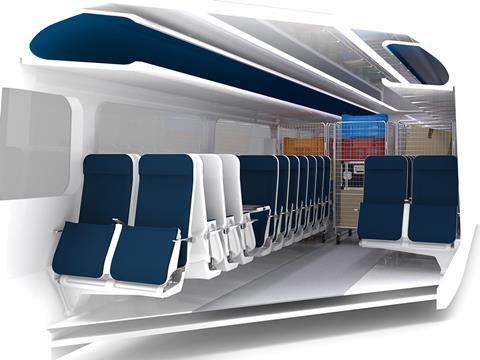
UK: The winners of £3·5m of government funding under the ‘First of a Kind: Demonstrating Tomorrow’s Trains Today’ innovation programme were announced by Transport Minister Jo Johnson on February 12. T
The FOAK competition is part of the Department for Transport’s wider Accelerating Innovation in Rail scheme. The first ‘challenge’ covers rolling stock, and saw organisations invited to bid for funding for technology not previously used on trains. Later funding will focus on other aspects of the rail system.
The projects selected were:
Adaptable Carriage (42 Technology Ltd, £349 590). Demonstrated at Railtex 2017, Adaptable Carriage enables train seats to be automatically folded and slid out of the way to provide space for trolleys carrying parcels off-peak. Innovate UK will support installation of the technology in a coach, and, subject to successful testing, support a pilot project.
New seating approach to maximise train passenger capacity (Transcal Engineering Ltd, £349 904). The Horizon seat design is intended to provide 20% to 30% more seats per coach for short journeys. Island Bay covers between high and low capacity for use on longer journeys and routes with varying demand. Aerolite is lighter, slimmer and more comfortable seat. All three designs will be integrated into a coach for display at InnoTrans 2018 before going on public display in the UK.
CloseRFIT (Unipart Rail Ltd, £350 000). An in-seat technology concept which would identify individual passengers, allowing automated validation of seat reservation and ticket status, reducing the need for train crew to undertake revenue protection activities. It could make reservations and release unused seats during a journey, to ensure optimal use of available capacity.
First of a Kind: Demonstrating Tomorrow’s Trains Today (Virtuosys Ltd, £345 401). Angel Trains plans to demonstrate a secure intermittent communications platform linking onboard and ground-based systems. This would support applications such as mobile public address announcements, secure messaging and enabling a train crew to access CCTV from a phone to ensure that train doors are clear before departure, that luggage is secure and to see how passengers are distributed.
AR Trainkit & Fantasia Express (Meyouandus Ltd, £343,000). Working with Virgin Trains East Coast to use augmented reality to show passengers local landmarks and provide commercial opportunities, such as adverts for jobs in nearby buildings or discounts at hotels.
Transreport Passenger Assist System (Transreport Ltd, £350 000). Enabling passengers with specific needs to request assistance in advance, at stations or onboard. Staff would receive the requests on smartphones, which automatically guide them to the passenger. If no staff are present, the technology automatically informs a central control system.
TRAin Footfall From Intelligent Counters (Block Dox Ltd, £350 000). Sensors would be used to monitor how people use trains, and then predict passenger flows to help manage crowding and devise more realistic railway timetables.
Inclusive On-board Experiences through Digital Augmentation (Guide Dogs for the Blind Association, £350 000). Guide Dogs for the Blind Association, Microsoft, Pointrlabs and Virgin Trains East Coast aim to facilitate journeys for visually impaired passengers by bringing together 3D soundscape technology, indoor navigation and intelligent sensors. Indoor navigation beacons will be installed at two stations in a proof of concept.
Wayscout: real-time onward journey platform for rail passengers on the train (Proxad Ltd, £256 490). Real-time onward journey ride matching technology on Gatwick Express would provide a 'novel personalised end-to-end journey experience' and demonstrate rail can form the backbone of a ‘mobility-as-a-service paradigm’.
Smart-Train – A Responsive Passenger Management System (Enable International Ltd, £330 995). Validating the technical feasibility and commercial model for a tool which would match a passenger’s individual requirements with current seating availability, facilitating more efficient management of platforms, boarding and alighting.

















